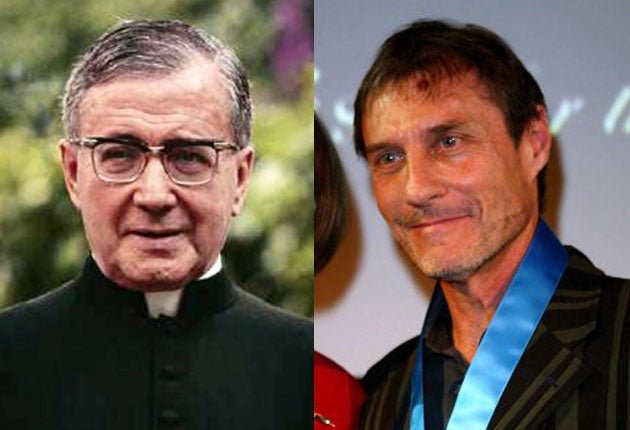Opus Dei lets film director in on some of its secrets
New film to explore history of controversial Catholic sect and its leader

The British film-maker Roland Joffe, who made his mark with his religious drama The Mission about crusading Jesuits in the Brazilian jungle, is to tackle an even more controversial chapter in the history of Catholicism: Opus Dei. Joffe is to recreate the life and miracles of Jose Maria Escriva de Balaguer, the Spanish priest who founded one of the most influential and secretive organisations within the Catholic church, and was canonised in 2002. The film seems set to stir up more controversy, following in the wake of several screen hits tapping into public fascination with tales of Opus-inspired crimes and conspiracies, which have set Vatican chasubles aflap.
The Opus furiously condemned the blockbusting Da Vinci Code in 2006, and its sequel Angels and Demons currently topping the bestseller lists. Opus members were banned from seeing or talking about Javier Fesser's award-winning Camino, 2008, about the cult of suffering. By contrast, Joffe's There be Dragons has received Opus Dei's blessing. "The film team asked us for help in gathering information and we gave them access to the documentation. That's the beginning and end of our collaboration with this film," says Luis Gordon, Opus Dei's former information officer. Mr Gordon said he was reserving judgment on the project's merits. The organisation denies reports that it was providing funds.
The plot starts from the present day, when a young London journalist decides to visit his estranged father who is dying in Spain, and mend fences. By chance the young man investigates one of his father's old friends, a priest, now dead, who is a candidate for sainthood.
The action zigzags through the violence and hatred of Spain's Civil War and crosses the Pyrenees to France, as the journalist uncovers the complex friendship that bonded the two men from childhood. Production notes in El Pais newspaper describe the film as "a drama full of passion, betrayal, love and religion... [it] reveals the importance and eternal power of forgiveness".
The Argentine-Spanish-US co-production will be shot over coming months at the pilgrimage site of Lujan in Argentina, and in Spain. The feature will star British actor Charlie Cox, who has worked in Spain with the director, Vicente Aranda.
The film focuses on the early years of Escriva's life during the 1930s, prompting concern that his rise during the Franco years may be brushed over. "This is a propaganda film written and supervised by members of Opus Dei in a desperate attempt to clean up its battered image in the eyes of public opinion," says an anti-Opus blog of former members who say they were "mentally and spiritually diminished" by the organisation.
The Escriva project circulated among Spanish film-makers for some time, stymied by the inability to find an actor for the leading role. Colin Farrell and the Argentine Juan Diego Botto are among those who had the script pass through their hands.
Jose Maria Escriva de Balaguer was born in north east Spain in 1902, son of an Aragonese shopkeeper. He studied for the priesthood and moved to Madrid where, in 1928, he founded Opus Dei, a secretive organisation that urged the individual to pursue sanctity through their work and daily life. It became influential during Franco's dictatorship and still retains support among members of Spain's political and economic establishment. Members are reluctant to declare themselves, or their medieval practices.
When Escriva died in Rome in 1975 bishops worldwide clamoured for him to be canonised, which he was in October 2002 by Pope John Paul II in St Peters in Rome. Roland Joffe has long wanted to make a film about Escriva. It was one of this "big projects", he said, along with a movie about the life of the spy Mata Hari.
Prayer and punishment: What is Opus Dei?
*Accused of being secretive, manipulative and fundamentalist, Opus Dei is perhaps the most controversial organisation in the Catholic Church, with critics calling it the "Holy Mafia". The group, whose name is Latin for "Work of God", has around 87,000 members across the world, around 70 per cent of whom are "supernumeraries", who are mainly married male or female professionals.
*There are also numeraries and associates who practice celibacy. The former normally live in communities known as "centres of Opus Dei". Some take part in self-mortification with a lash once a week or through wearing a spiked chain around the thigh for several hours a day. To outsiders, this aspect of physical self-punishment is one of the most baffling.
*To join Opus Dei for life, members have to go through a preparation lasting over five years. Members are also required to donate a proportion of their earnings. The movement does not publish its general accounts and questions surround the wealth of the organisation. The Labour MP Ruth Kelly confirmed last year that she is a member.
Join our commenting forum
Join thought-provoking conversations, follow other Independent readers and see their replies
Comments